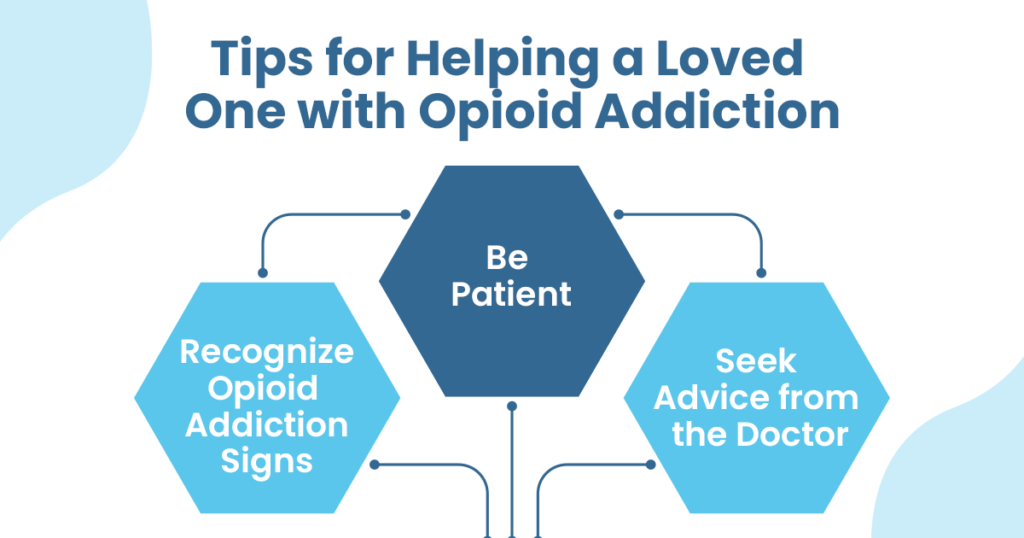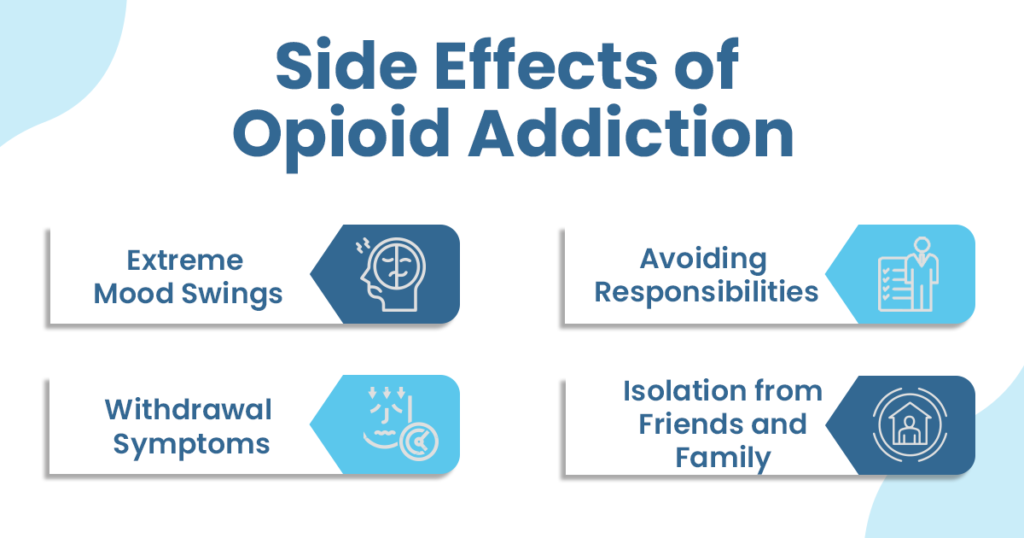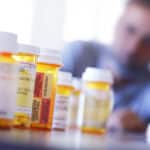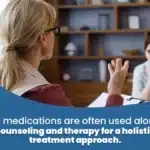
While opioids are very effective at relieving pain, they are still dangerous if not used as prescribed and closely monitored by a physician. For this reason, they should only be used as directed. It’s also important to know how to take an opioid properly, as alterations to the dosage or method of administration can lead to overdose.
You can consult with the supervised doctors at The Haven Detox if you have any questions or concerns about your medication. Contact our healthcare Haven facility immediately if you suspect you’re abusing an opioid. We look for ways to stop an opioid overdose and avoid dependency.
Addiction Problem
If you’re taking opioids for a medical problem, ensure you get the correct dosage. Opioids are highly addictive, and it’s easy to get addicted to them if you use them longer than recommended. Always follow your healthcare provider’s instructions and never exceed the recommended daily dosage. Talk to your doctor about the associated risks of using opioids to relieve pain. You might have an overdose or become dependent on them.
Avoid Responsibilities
Opioid users may put others’ safety at risk when they overdose. They may neglect their responsibilities and cause interpersonal problems. Students may also miss work or school responsibilities. Most Opioid users experience unpleasant withdrawal symptoms if they stop using the drug.
Withdrawal Symptoms:
Over time, opioids become less effective, leading to withdrawal symptoms. Withdrawal symptoms start anywhere from 12 to 30 hours after you stop taking them. These symptoms can last a few days but can be very painful. It’s important to remember that the opioids you take are only a temporary solution to your pain. It’s best to stop using them gradually. Initially, your body may be able to cope with less of them, but the longer you take them, the more intense they’ll become. Numerous opioid side effects include:
- Respiratory depression
- Hyperalgesia
- Seizures
- Insomnia
- Jittery nerves
Opioids can also be highly addictive, and people with chronic pain are at greater risk of addiction. Opioids are a significant cause of fatal overdoses, so you must talk to your physician about your specific condition and potential risks.
Our professional doctors will help you out if you want to quit opioids safely. And don’t forget to talk with your family if you’ve become addicted. Haven Detox is one of the best facilities in the United States for addiction treatment. You can get help at any time from us.
Common Signs of Opioid Addiction
Many common signs of opioid addiction can indicate a problem. You may want to see a doctor if you notice these signs. A decreased personal hygiene is one of the most prominent signs of opiate addiction. A person with opiate addiction has poor oral hygiene and may brush their teeth less frequently or stop altogether. They may also need to commit acts of violence or other crimes to get their fix.
Other signs of opioid abuse include extreme mood swings. They may seem happy and irritable when high but become angry when the drug wears off. They may become aloof and isolate themselves from family and friends. They may also become depressed or jittery. A person suffering from opioid addiction may also be absent-minded or withdraw from social situations..
How Can You Tell If You or a Loved One Is Struggling with Opioid Abuse?
If you’re struggling with opioid addiction, you’re not alone. It can impact your health, finances, work, school, relationships, and more. While you may not realize it, friends and family members may be aware of the addiction and may notice changes in their loved one’s behavior. If you know someone suffering from opioid addiction, you can help them get the treatment they need. You can do the following actions if you observe someone who needs help with opioid addiction.
Recognize Opioid Addiction Signs
When dealing with opioid addiction, you must recognize the signs. People who suffer from opioid abuse have intense and noticeable mood swings. They may become angry or hostile suddenly, or their normal behavior may become strange. They might become withdrawn and have trouble concentrating. Seeing these signs early on may save your loved one’s life.
If you’re concerned, talk to your loved one about their problem and offer support. The best way to tell if your loved one is struggling with opioid abuse is to keep an eye on them. These signs are common but sometimes challenging to recognize. The key is to be patient and understanding. People struggling with addiction may ignore their concerns or pretend they’re not a severe problem. If you have a close relationship with them, encourage them and keep an eye on their behavior.
Seek Advice from the Doctor
If you suspect that you or a loved one is struggling with opioid addiction, it’s essential to seek help as soon as possible. The first step to getting the proper treatment for opioid addiction is to seek the advice of a pain medicine specialist. They can help you learn how to safely and wisely use opioids.
Types of Treatment for Opioid Addiction
There are various types of treatment for opioid addiction. These include Medication-assisted treatment (MAT), Psychosocial therapy, Naltrexone, Behavioral drugs, and HIV risk reduction counseling. In addition to these types of treatment, addiction counseling can include group activities, such as Narcotics Anonymous. For more information, please read on. You learn different types of treatment for opioid addiction at Haven Detox rehab center.
Medication-Assisted Treatment
Medication-assisted treatment for opioid dependence combines behavioral therapy and counseling with FDA-approved medications to help patients overcome addiction to addictive substances. Treatment plans should be tailored to the individual’s needs and provide a supportive environment. A common goal of medication-assisted therapy is to reduce the cravings for addictive substances while maintaining the quality of life.
Medication
The following are some of the medications used to treat opioid addiction.
- Methadone
- Buprenorphine
- Naltrexone
- Naloxone
These medications reduce physical dependence on opioids and ease withdrawal symptoms. Because the medication doesn’t interfere with the person’s cognitive functioning, patients can work, attend school, and care for their families while receiving treatment.
Counseling Services
Medication-assisted treatment for opioid dependency is a proven approach to recovery. It combines counseling and social support services to help patients overcome their addictions and lead productive lives. This therapy helps the patient’s brain heal from the effects of addiction.
Psychosocial Therapy
Psychosocial interventions are a critical component of the effective treatment of opioid addiction at Haven rehab. Psychosocial therapy has been proven effective when combined with medications, according to research published in the Journal of Addiction Medicine, the official journal of the American Society of Addiction Medicine (ASM).
Cognitive Behavioral Therapy
The most common psychosocial interventions studied include cognitive behavioral therapy and contingency management, primarily used in conjunction with methadone treatment. However, these methods may not be effective in all patient populations and some treatment settings.
Naltrexone
When used as part of a treatment plan, Naltrexone prevents the person from experiencing the high that comes from opioid use. The drug helps individuals develop recovery-oriented skills before discontinuing the medication. During withdrawal, avoiding alcohol and sedatives and seeking medical supervision is essential. This treatment can also reduce a patient’s tolerance to opioids. The drug has also been associated with side effects such as nausea and vomiting.
The dosage of Naltrexone varies from patient to patient. During the first few days of treatment, the patient must wait at least 7 to 14 days after the last opioid use. The patient should notify the healthcare professional of any changes in their medications. This medicine is usually administered by a healthcare professional once a month or every four weeks. It is essential to follow the prescribed doses.

Frequently Asked Questions (FAQ)
Is it possible for a person to have opioid addiction?
Opioid addiction, sometimes referred to as opioid use disorder (OUD), is a lifelong illness that can strike anyone. In actuality, opioid addiction affects millions of Americans. Addiction is treatable, just like the majority of other chronic diseases.
What opioid is the most addicting?
Heroin is the fastest-acting and most misused opioid, according to the National Institute on Drug Abuse (NIDA).
What are some signs that someone has opioid addiction?
Some of the common signs of opioid use disorder are:
A decline in coordination
Breathing too slowly or shallowly
Significant nausea or vomiting
Constipation
Unsteady speaking
Drowsiness
Shaking
Sweating
What is your take on opioid addiction?
Opioid receptors are on nerve cells in the brain, spinal cord, gut, and other body areas. When you take on opioid addiction, the opioids stop the transmission of pain signals from the body to the brain via the spinal cord.
How long does it take to develop an opioid addiction?
The rehab facilities are dealing with two problems with opioids. The first is an addiction problem, and the second is dependence. Opioid dependence can develop quickly, within a week to two weeks in some cases, but not for nearly a month in others. A brain disorder or addiction can strike anytime based on heredity and other circumstances.
Recover in a Safe and Comfortable Environment at The Haven
Since the opioid epidemic began, rates of opioid abuse have steadily increased, reaching record highs. In 2015, more than 900,000 Americans had used heroin, and 4.3 million had taken prescription opioid pain medications for nonmedical purposes. There’s no cure for opioid addiction, but a treatment option exists for those suffering from this disorder.
The recent rise in opioid use has led to the development of highly effective medications for treating opioid addiction. These medications are typically used in conjunction with psychosocial interventions. You will find the best treatment option for opioid abuse from the Haven Detox. We provide detoxification and inpatient or residential rehab treatments, and much more.
Our facility offers a comfortable environment where patients’ recovery is going very fast. Get more detailed information about our therapeutical services by calling us at (561) 328-8627.






